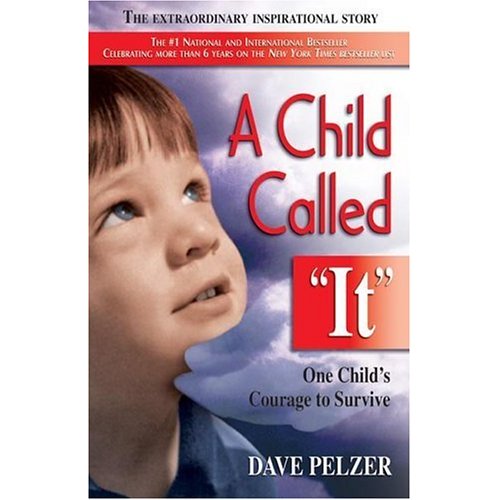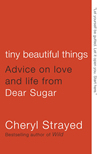I am in love with books and writing and words. For my first list of noteworthy nonfiction I have selected two of the most powerful nonfiction books I have read. One has words that will shake you down to your core, making you feel every emotion in the human spectrum, and captivating you with the power (and truth) of its prose. The other is a heart wrenching story of survival that is both inspiring and a nonstop kick in the gut. Next time I promise to make things a little lighter. 😉
“Tiny Beautiful Things: Advice On Love And Life From Dear Sugar”
by Cheryl Strayed (published July 10, 2012) ![]()
“Tiny Beautiful Things” by Cheryl Strayed is a collection of letters and responses from her column Dear Sugar. The Dear Sugar column on therumpus.net was answered by Strayed anonymously from 2010 until after she published her memoir “Wild” (another title to look for on one of my future lists). While it is a collection of columns, it reads more like a collection of essays that beautifully paint the picture of the human condition.
Strayed is one of my favorite writers (another one of my writer’s crushes) and this book demonstrates why. Her prose is moving, funny and fearless. She strips away any preconceived notions and rather than trying to be PC or guarded, she bares her own relevant life experiences in much of her advice. Topics from this book cover everything from fear, abuse, addiction, grief, envy, relationship advice, and more philosophical matters.
When I read one of the letters about a father grieving years after his death of his son, who was taken before he had a chance to become an adult, because someone else chose to drink and drive, was heart wrenching. I remember at this point tears came to my eyes after reading his letter and Strayed’s response and I had to put the book down. Sometimes you expect great books will not allow you to put them down, but in some cases there is nothing else you can do. You have to sit and digest the power of the words and message you have just read.
Another example of Strayed’s brilliance in this book (and her column) is when she answered what most would consider a throwaway letter. “WTF? WTF? WTF? I’m asking this question as it applies to everything every day.” Cheryl wrote a response that I am sure shocked many with her unflinching honesty and take on how to best answer this question. At the end of her response she concluded, “The fuck is your life. Answer it.”
Strayed was not interested in playing shrink or a detached expert who focused on her readers and never made her column personal. She set out to make her own rules (thankfully for us!). This book will make you laugh, and it will make even the hardest of hearts tear up, and those of us who are less hard will cry (have tissues ready). This book shows us what humanity is, in all of its flaws, and how it is those flaws that make people so beautiful. And truth never sounded so good.
I made my husband read this book, and I rarely have ever said “You have to read this.” It is that kind of book, the book you not only need to read over and over, but one you need to share. For me, this is the classic example of a book I need to own. To save money I try to only purchase my favorite books, first reading them in libraries etc. but this is a book that I cannot borrow. I need it on my shelf, a friend to revisit and that is always there.
So, if you want to be moved read this book. If you want to laugh read this book. If you want to read beautiful and honest prose read this book. If you want to see humanity from the despicable to the miraculous and from the silly to the deeply profound read this book. And just in case I have not been clear already: READ THIS BOOK. You’ll be glad you did.
“A Child Called It: One Child’s Courage To Survive”
by Dave Pelzer (Published September 1, 1995) ![]()

“A Child Called It” by Dave Pelzer is the story of a child’s unbreakable spirit to survive. This is a book about child abuse of the most horrific variety. Dave Pelzer was placed in foster care at the age of twelve and it has been said that his case was one of the worst in California history. The book takes the reader on a terrible journey of being a child who knows no safety, who feels subhuman and pushes himself to prove his tormentor wrong, sometimes fueled by hope and other times by hate… whatever it takes to survive that moment.
A warning – this book, while short and simple since it is written from a child’s perspective can be incredibly difficult to read (particularly for anyone who has or loves children). The abuse Pelzer suffered included beatings, being stabbed, locked in a bathroom with ammonia, and starved… and these are not the most ‘difficult to get through’ examples of abuse in the book. Some people have called it gratuitous, but I disagree. He is sharing HIS story. The abuse he suffered was gratuitous and this book is about said abuse.
This book is a national bestseller and Pelzer has done very well for himself in terms of branding his message of resilience. I do not find fault in this; I think it is smart, and why not? A few have gone so far to question some of the details of the abuse in question. I do not believe anyone questions he was abused (this was after all a court case that found he was being abused at a time when child abuse was still considered taboo at best) but I think they question the severity. I do not believe Pelzer sensationalized his story intentionally, if at all. I think many people forget that memoir is about sharing your truth. Memoirists check facts and don’t set out to lie, but they are people who are sharing personal stories rather than biographers looking only at verifiable facts. Memories are tricky things.
The writing in this book is not exactly high caliber. I know many who think the writing itself is terrible and complain that just because someone has a story to tell, does not make him/her a writer. Pelzer states that he wrote from the perspective of a child between the ages of six and twelve, but that does not explain away everything. I take this into account, so I am not as troubled with the simplistic language or construction issues as others seem to be, but I think with the right language and writing chops, writing it from a child’s perspective should have made this book more powerful and the weakest aspect of this book, is in fact the writing. The story holds me and tears away at me, but the words have little to do with it.
This book is the first of a trilogy (I will cover the rest of the trilogy in future noteworthy nonfiction lists) so there is no set resolution on what happens to Dave Pelzer, there is a sense that by the book’s end he is safe for the time being (this is not a spoiler since the book starts out with his rescue and then circles back to it). This is the experience through a child’s eyes, so if you are hoping that Pelzer tries to reflect on what happened to him or rationalize what his mother was thinking, keep moving. He was twelve when he was rescued and anyone familiar with child abuse and the ‘system’ understands that it is hardly over once someone finally realizes there is a problem. This book still ends, when Pelzer is in the thick of it.
I am not sure Pelzer will ever divulge these things (I am on book three) and while I look forward to his final book in the trilogy reflecting on things, I am not sure what I would think of him trying to understand his mother’s ‘process’. Many people do not seem to get something very simple: abuse is never okay. Trying to figure out his mother’s process or why she turned into the monster under his army cot (he was not allowed to sleep in a bed) is not productive. He survives and later thrives. He eventually had a son and breaks away from the cycle of abuse. This is what matters. And while I have no doubt, he would have accomplished this even if he spent time trying to figure his abuser out, it would have made that journey much harder and perhaps much longer. No answer or revelation would have ever given him peace, because there is no peace there. There is peace with moving forward and getting beyond his circumstances and that is what he does.
This is an inspiring, yet tough-to-stomach book to read. It is a great child abuse memoir (or just a great book on the subject in general). If you don’t have the stomach for it, do not pick up this book, you will be upset. If you can stomach it, however, and have not read it yet, I strongly encourage you to do so. While the message of resilience is not as overt as it is in subsequent books, it is certainly there. He survived and that is no easy feat. When you live in that situation, you are in a war and there is no safe space. Surviving the monsters while not becoming a monster yourself is powerful and something many critical readers fail to grasp.
There you have them! I love when people leave me comments, so don’t be shy and be sure to look for next month’s lists of noteworthy fiction and nonfiction (to be posted in late March). Expect books on writing style and mechanics, publishing and some memoirs on next month’s list. (Next month’s top pick is hysterical – I keep laughing out loud, literally, and my husband keeps shooting me strange looks when I do.)
Do you have a book you want me to consider? Leave me a comment. As long as my reading list is, I am always looking to add to it!
-DMW








